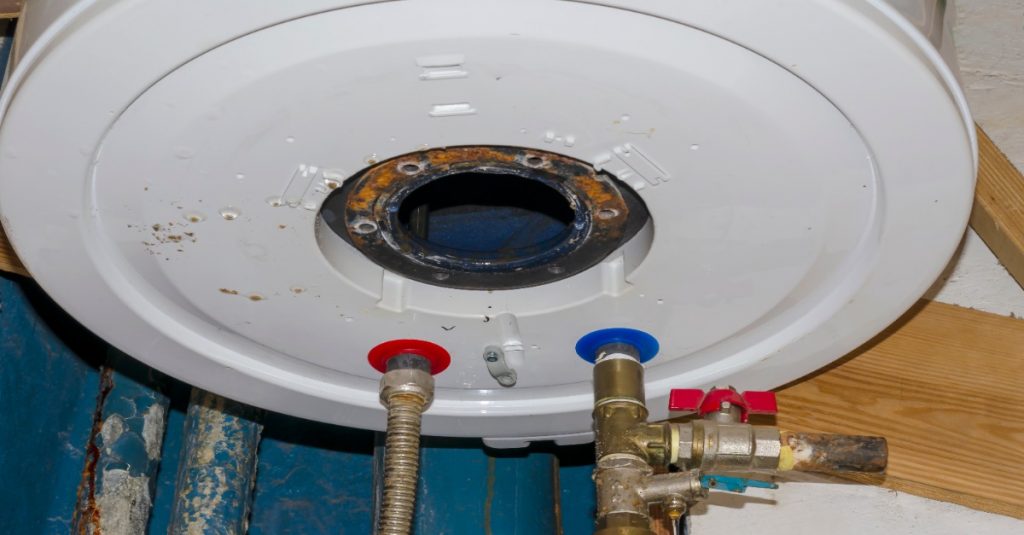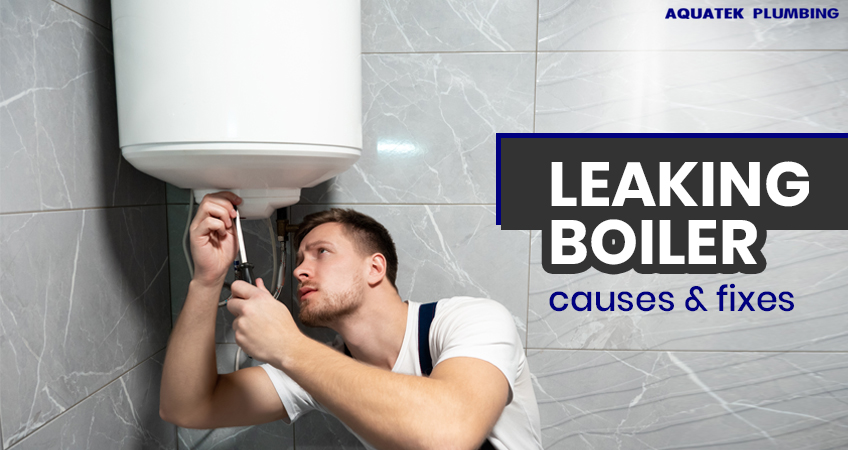If you’ve noticed a patch underneath your boiler, or water dripping for a while, then you most likely have a leak. This could be for a number of reasons, but ideally, you need to fix the leaking boiler as soon as possible. A leaking boiler could cause dampness or mould. To avoid any potential damage to your property or your neighbours, turn off the water supply and contact a technician.
There are some issues you’ll be able to fix yourself if you’re brave enough. If your boiler installations are done correctly, then often internal leaks are caused by problems with corrosion and other things that we will discuss below, in which case you’ll need a heating expert.
Aquatek plumbing is the leading heating engineer and local expert in all things related to boiler leakage. We have a team of experts that have handled all sorts of issues related to boilers. Our services ensure a complete resolution to your boiler leaking issues.
Why is your boiler leaking water? – main causes of boiler leaks
Corroded or bad pipework can cause boilers to leak water from the bottom
After a while, your pipework could become corroded over time due to the constant passing of water mixed with metallic debris in the system. This weakens the pipes and causes the boiler to start leaking water. You’ll be able to tell this just by looking at it. If your boiler looks cracked and worn, then the years have started taking their toll.
If your boiler is over ten years old, then, unfortunately, it’s probably on its last legs, certainly if it’s corroded. If the corrosion has started causing you problems, then it’s definitely time to replace your boiler. Call an expert to inspect the condition of your boiler, and look into getting a new one installed.
Boiler pressure is too high
Boiler pressure needs to be monitored and regulated. Boilers don’t do well under pressure. In fact, if the pressure is too high, then this could cause some serious damage. What happens exactly is the pressure release valve (PRV) will discharge excess water, or parts internally will fail completely. This is often the reason behind water dripping from the boiler.
Your boiler should have a pressure gauge on the front. You can check this to make sure there aren’t any pressure issues. For combi and system boilers, this pressure gauge should be at approximately 1 bar within the green section. Anything over that means that the pressure is too high, and it needs to be fixed.
You can reduce the pressure of your boiler yourself if you want to. You’ll need to “bleed” the system. Before you start, check the filling loop tap, this is the silver pipe sticking out underneath your boiler, which is firmly closed. It should have little tap switches on the top that need to be shut tightly.
Once you’ve checked this, you’ll then be ready to bleed your radiators. Take a bleed key and loosen the nut on the radiator, and you’ll notice water from your system coming out. This releases the necessary pressure, and you can do the nuts back up. Always contact a technician if you’re unsure.
General wear and tear corrosion in the boiler system
As with any appliance, boilers age and get worn out over time from long-term usage. In time, the metal system can become damaged by the repeated heating and cooling of water and eventually crack. Cracks can cost a lot to repair, and it’s usually worth having the whole thing replaced. The more corrosion and damage to the system, the more likely it is you’ll have leaks.
If you want to prevent this, keep on top of maintenance checks. Have a look at the insides of your boiler once a year at least, or if you have a leak. You’ll be able to see any cracks or corrosion easily. Depending on the severity, you’ll probably need a new boiler if these are causing leaks. Contact a boiler company to give you a quote online.
Broken heat exchanger
The heat exchanger is one of the most important features of your boiler, not to mention the most expensive to replace. These often fail over time due to cracks and corrosion as well, particularly in cheaper low-quality boilers. A faulty heat exchanger can is one of the most common causes if your boiler is leaking water.
These need to be inspected by a qualified gas engineer. If your heat exchanger is faulty and needs replacing, you’ll probably be better off cost-wise if you get a new boiler.
Faulty seals inside boiler
Broken seals on joints and internal parts can also be a common cause of a leaking boiler. These can also succumb to wear and tear or decay. If the seals between pipes break, then this can cause severe leaking.
You can check the seals yourself if you like, but it’s advisable to call out an engineer straight away. Repairing these can be delicate work. Small leaks, however, can be fixed quickly and cheaply.
Temperature issues
Temperature issues can cause leakage in a boiler in several ways. One of the most common ways is through thermal expansion. When a boiler is heated, the metal components expand. If the expansion is too great, it can cause the metal to warp or crack, leading to leaks in the boiler. Another way temperature issues can cause leakage in a boiler is through overheating. If the boiler is not properly maintained or if there is a malfunction in the heating system, the temperature inside the boiler can become too high. A faulty temperature control valve is a major reason for this. This can cause the metal to weaken and become more susceptible to leaks.
Furthermore, if the temperature in the boiler fluctuates too much, it can cause the metal to expand and contract repeatedly. This can lead to stress on the metal and cause it to weaken, leading to leaks. It’s essential to ensure that the boiler is properly maintained and the temperature is kept within safe limits to prevent leaks. Regular inspections, maintenance, and repairs can help prevent temperature-related issues and ensure the safe and efficient operation of the boiler.
What to do if your boiler is leaking! – Step by step


Step 1) Check over the boiler to identify anything you can, such as the location of the leak or any problem parts. This will help you provide accurate information to the heating engineer when you contact them.
Step 2) Take steps to reduce leaking or collect water to prevent further water damage to the boiler surroundings. You may need to use towels, buckets or other containers to collect the water. If the leaking is severe, it’s important to turn off the electricity and gas supply to the boiler and evacuate the area.
Step 3) Reduce boiler pressure if you are able to. If the pressure is too high, it can cause the boiler to leak. You can reduce the pressure by bleeding the radiators or using the pressure release valve if you are confident in doing so.
Step 4) Contact a reliable heating engineer to investigate and diagnose the issue. It’s important to choose a professional who is Gas Safe registered and has experience in repairing boilers.
Step 5) Have the heating engineer fix the problem. The engineer will assess the issue and provide you with a quote for the repair. If the repair is affordable, have the engineer fix the problem as soon as possible to avoid further damage to the boiler or surrounding areas.
Step 6) In the worst-case scenario where the boiler cannot be repaired, shop around for replacement boilers to be fitted. The heating engineer can advise you on the best options and provide you with a quote for installation.
Consequences of a leaking boiler – dangerous or inconvenience
Leaking boilers can be dangerous, but in most cases, they are just inconvenient and expensive. It’s important to address any leaks promptly to prevent further damage to the boiler or surrounding areas. Here are some potential costs associated with leaking boilers:
Replacement parts: Depending on the severity of the leak and the parts required, replacement parts can be expensive.
Excess energy usage: Leaks can cause the boiler to work harder, resulting in higher energy bills.
Damage to home around the boiler: Water damage from leaking boilers can cause damage to flooring, walls, and other structures around the boiler.
When considering whether to repair or replace an old or faulty boiler, it’s essential to weigh up the pros and cons. Here are some factors to consider:
Total costs: While the cost of a new boiler may seem high, it’s important to consider the total costs of repairs and maintenance of an old or faulty boiler.
Cost of repairs: If the cost of repairs is high, it may be more cost-effective to replace the boiler.
Labour: The labour costs for repairing a boiler can be significant, especially if the repair requires a specialist.
Energy efficiency: A new boiler may be more energy-efficient, resulting in lower energy bills in the long run.
Warranty: A new boiler will come with a warranty that will cover any leakages or breakdowns that occur for the next few years.
Can you fix your own boiler leak?


It would be best if you did not try to fix your own leaking boiler. This is something that must be left to the professionals. You must consult a qualified heating engineer and let them look at the issue to determine its severity and what measures are needed to rectify the problem. If you try to fix it on your own, it can lead to dangerous consequences like electrocution, short circuit and even fire.
If your boiler has minor issues like loose pipe joints that need tightening or sealing small pin holes with a boiler leak sealant, then that is something you can endeavour to do yourself. But, even when doing these minor repairs, you must take proper safety precautions like shutting off the water, making sure the boiler is off, and ensuring the pipes are not too hot, etc.
Keeping all this in mind, you should know that such minor issues that you can fix on your own are rare. In most cases where your boiler is leaking, you must contact the experts for their services.
What can you do to prevent your boiler from leaking?
Unfortunately, all boilers have a shelf-life, so you can’t prevent them from eventually giving in to wear and tear. The best thing to do is to make regular checks on the piping joints, seals, and pressure gauges. Often systems or chemical flushes are also offered with installation, which can help extend their life expectancy. With regular maintenance, your boiler can last longer.
With that said, there are a few things that you can try in order to prolong your boiler’s life and avoid leakage.
Yearly boiler servicing
Getting your boiler serviced annually is really important. It can help prolong its life and reduce minor issues that may arise and lead to leakage.
Flush system at regular intervals
There are mainly two ways that you can flush the boiler’s system.
- Power flush
- Chemical flush
A power flush is a method of cleaning a central heating system, including a boiler, by using high-pressure water to remove any sludge, debris, or other contaminants that have built up over time. It is a thorough and effective way to clean the entire heating system, including the boiler, radiators, and pipework. At the same time, a chemical flush is a method of cleaning a boiler and central heating system by using chemical solutions to break down and remove any buildup of contaminants that can affect the performance of the system.
Ensure that you have a magnetic boiler filter
A magnetic boiler filter is a device that is installed in a boiler’s heating system to help protect it from debris and other pollutants that can affect its efficiency and lifespan. The filter uses a strong magnet to attract and capture any metallic particles or debris that are circulating in the heating system.
Choose a reliable and reputable brand of boiler (check reviews online)
You can check your local retail store or choose to buy from an e-commerce site. However, make sure you buy a boiler that is of a good and reputed brand. You can read the online reviews of the one you are interested in to help you decide.
Regularly check pressure and temperatures
Regularly checking pressure and temperatures are important for a boiler because it helps ensure that the boiler is operating safely and efficiently. The pressure and temperature inside a boiler can have a significant impact on its performance and lifespan and can also pose a safety risk if they are not within safe levels.
A guide on fixing a water leak from a boiler by Aquatek
Aquatek is a leading heating engineer in Essex, London and Kent, offering supply, installation, maintenance as well as servicing for boilers. We have 35 years of experience in this field. We are renowned for our fast response, and we stand by our work. We offer the most competitive pricing, and you can call us for any emergencies.
If you are looking to get any advice for your boiler, you can reach out to our experts or contact us for a free quote on our services.



